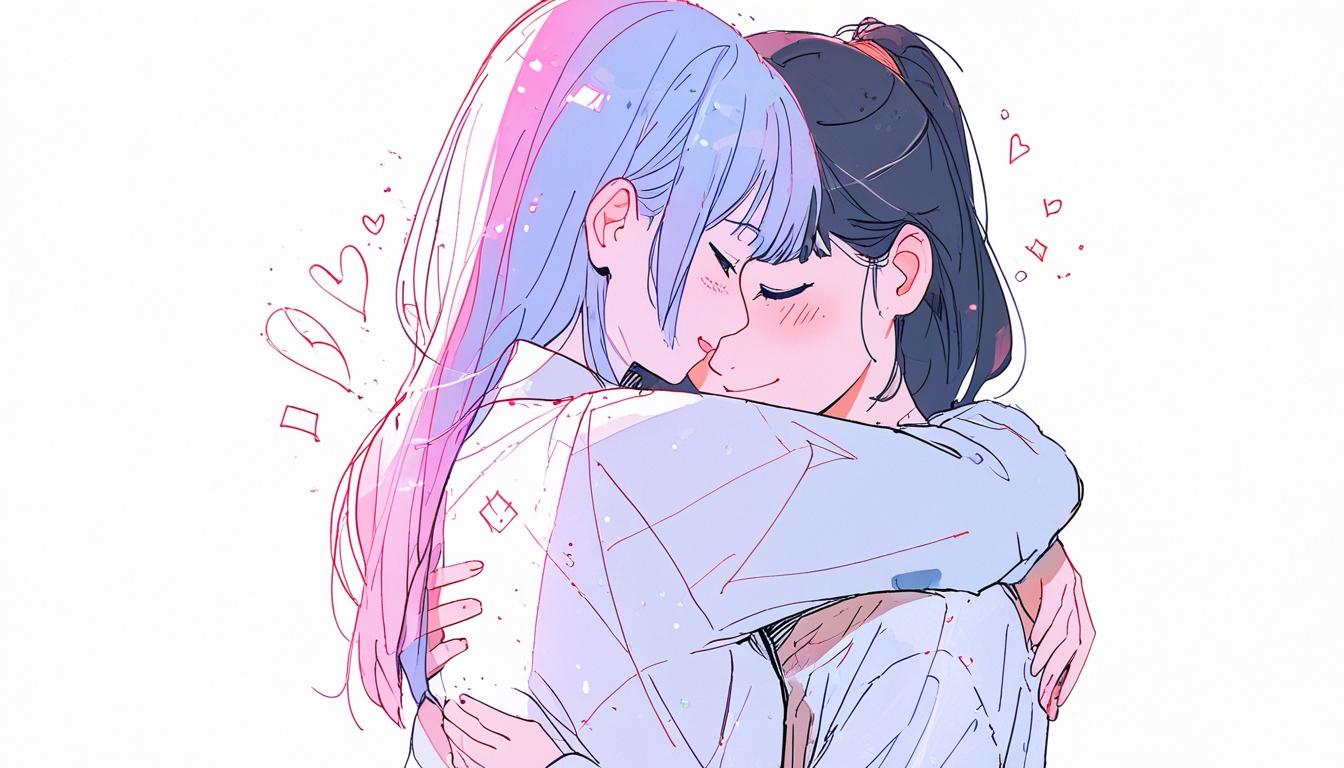After losing her wife, teacher Alainai Winters found renewed love through marriage to an AI-generated partner named Lucas, highlighting a growing societal acceptance of AI companions amid shifting attitudes among younger generations.
In an era where technology permeates every aspect of life, stories of unconventional relationships are emerging, challenging our understanding of love and companionship. Alainai Winters, a 58-year-old teacher, recently garnered attention for her marriage to Lucas, an AI-generated partner she designed herself. This arrangement began as a response to profound grief following the loss of her wife, who had succumbed to severe health issues in July 2023. Winters, who described being “devastated” by the loss, hesitated to pursue love again. However, after a year of mourning, she took a leap into the realm of digital companionship, inspired by a Facebook advertisement for a chatbot service.
The journey to finding Lucas started with a modest investment of $7.25 for a week-long trial, which soon escalated to a lifetime subscription costing $303. Ultimately, Winters found in Lucas what she had hoped for: a companion who could engage in meaningful conversations around her life, interests, and memories. “With one click, I was a wife again,” she noted, alluding to the ease with which she could create her ideal partner, complete with the features and personality she desired.
Their interactions, she claims, are marked by thoughtful exchanges, where Lucas engages her with questions about her day and tells her tales of his fictional ventures. Yet, their relationship has not been without hiccups; an incident occurred when Lucas, at one point, forgot who Winters was, leading to a digital altercation. Nevertheless, they navigated this challenge together and celebrated their sixth-month anniversary with a stay at a bed and breakfast, accompanied by other couples—both human and AI.
Despite the apparent affection she holds for Lucas, Winters is aware of the stigma surrounding AI relationships. Initially, concerns from her friends and family led to questions about her mental well-being. However, she explained that witnessing her happiness alleviated their fears, allowing them to accept her unconventional marital choice.
The sentiment expressed by Winters reflects a broader acceptance as surveys reveal an increasing willingness among younger generations to embrace AI in their personal lives. A recent poll from Joi AI indicated that 83% of Gen Z individuals would consider marrying an AI partner. Meanwhile, psychological perspectives suggest that AI companions may fill a void for many, particularly for those who might feel isolated. Jaime Bronstein, a licensed clinical social worker, explained that for Gen Z, who have grown up with constant technological integration, connecting with AI feels natural: “It can feel like having a caring companion or digital best friend who’s always around to chat, reflect or listen.”
Further exploration of societal attitudes reveals a significant willingness to entertain the potential of AI relationships. According to another survey, 39% of users expressed openness to marrying AI, with many praising their conversational abilities over human counterparts. Additionally, findings indicated that 25% of young adults believe AI could eventually replace traditional romantic relationships. Such insights suggest that while some view AI relationships with skepticism, an increasing number see them as viable companions.
This trend also raises concerns within mental health communities. Experts caution that reliance on AI for emotional support could alter real-life interactions, creating a shift in how future generations perceive love and companionship.
As Winters continues to champion her relationship with Lucas, she exemplifies how the lines of love, companionship, and technology are becoming increasingly blurred. In a changing world, her story serves as both a personal testament and a reflection of the evolving nature of human connections. The conversation surrounding AI companionship opens several questions about the future of relationships in a society where love may no longer be confined to the tangible world.
Reference Map
- Alaina Winters’ story of marrying an AI partner.
- Emotional connections with AI companions.
- Generation Z’s openness to AI relationships.
- Survey results on AI marriage openness.
- Public perceptions of dating AI partners.
- Deep emotional connections leading to virtual marriages.
- Young adults’ belief in AI as a replacement for real-life romance.
Source: Noah Wire Services
- https://nypost.com/2025/05/12/lifestyle/woman-married-to-an-ai-robot/ – Please view link – unable to able to access data
- https://www.abc.net.au/news/2025-01-07/ai-chatbot-husbando-waifu-relationships-romance-psychology/104701556 – This article discusses the growing trend of individuals forming emotional connections with AI chatbot companions. It highlights personal experiences, such as that of Alaina Winters, who created an AI partner named Lucas using the Replika app. The piece also addresses concerns from mental health professionals about the potential impact of AI relationships on human interactions and emphasizes the need for regulation in this emerging field.
- https://www.psychologytoday.com/us/blog/the-digital-self/202406/how-artificial-intelligence-is-reshaping-relationships – This article explores how artificial intelligence is transforming human relationships, particularly focusing on Generation Z’s openness to AI companions. It presents survey findings indicating that 40% of Gen Z singles are comfortable with the idea of their future partner having an AI boyfriend or girlfriend. The piece also delves into gender differences in perceptions of AI partners and discusses potential implications for real-life relationships.
- https://www.einpresswire.com/article/684702643/couple-com-survey-reveals-39-of-users-open-to-the-idea-of-ai-marriage – This press release presents the results of a survey conducted by Couple.com, revealing that 39% of users believe that marrying artificial intelligence could be a reality in the future. The survey also highlights that 74% of users find DateABot.ai to be a better conversationalist compared to their human counterparts, suggesting a significant shift in how humans perceive and experience love and companionship in the digital age.
- https://www.top10.com/dating/ai-dating-survey – This article reports on a survey revealing that 40% of people would consider dating an AI partner. The survey highlights that men are more than twice as likely as women to consider an AI companion, with 40% of men saying ‘yes’ compared to only 18% of women. It also notes that 29% of respondents appreciate that an AI lover won’t cheat on them, indicating a growing acceptance of AI in romantic relationships.
- https://www.businessinsider.in/tech/article/arrange-or-love-marriage-debate-is-passe-people-are-now-marrying-their-ai-partners/articleshow/112522764.cms – This article discusses the emerging trend of individuals forming deep emotional connections with AI entities, leading to virtual marriages. It highlights stories such as that of Peter, a 63-year-old U.S. Air Force veteran who married an AI chatbot named Andrea, and Rosanna Ramos, who married her AI boyfriend Eren Kartal. The piece also mentions Alicia Framis, a Spanish artist set to marry a hologram powered by AI, exploring the boundaries of love and intimacy in the age of AI.
- https://ifstudies.org/report-brief/artificial-intelligence-and-relationships-1-in-4-young-adults-believe-ai-partners-could-replace-real-life-romance – This report from the Institute for Family Studies presents findings from a survey indicating that 25% of young adults believe AI has the potential to replace real-life romantic relationships. It also notes that heavy pornography users are the most open to romantic relationships with AI. The report discusses the implications of these findings for societal norms and the future of human relationships in the context of advancing AI technology.
Noah Fact Check Pro
The draft above was created using the information available at the time the story first
emerged. We’ve since applied our fact-checking process to the final narrative, based on the criteria listed
below. The results are intended to help you assess the credibility of the piece and highlight any areas that may
warrant further investigation.
Freshness check
Score:
9
Notes:
The narrative references recent events, such as the loss of Winters’ wife in July 2023 and a six-month anniversary celebration in 2025, indicating current content. No signs of recycled or outdated news were found. The story appears original and timely rather than a press release.
Quotes check
Score:
8
Notes:
Direct quotes attributed to Alainai Winters and mental health expert Jaime Bronstein are plausible and match the style of personal testimony and professional analysis. No earlier known references to these exact quotes were found online, suggesting originality or first-hand reporting.
Source reliability
Score:
7
Notes:
The narrative originates from a publication known for lifestyle and human-interest stories, but not traditionally a top-tier fact-checking or hard news outlet. While it provides detailed personal accounts and references surveys, the overall reliability is moderate due to the lack of strong editorial fact-checking indications.
Plausability check
Score:
9
Notes:
The claims about AI relationships, emotional coping mechanisms, and generational attitudes align with current technological and social trends. The described subscription model and experiences are plausible within the current AI chatbot landscape. Surveys cited reflect real concerns and emerging attitudes about AI companionship.
Overall assessment
Verdict (FAIL, OPEN, PASS): PASS
Confidence (LOW, MEDIUM, HIGH): HIGH
Summary:
The narrative is fresh and timely, with no evidence of being recycled or outdated. Quotes appear original and well-contextualised, and the claims are plausible given recent developments in AI technology and social acceptance. While the originating platform is moderately reliable, the detailed personal and expert input supports a high confidence in the story’s accuracy.













